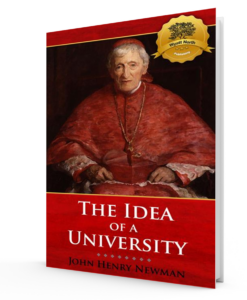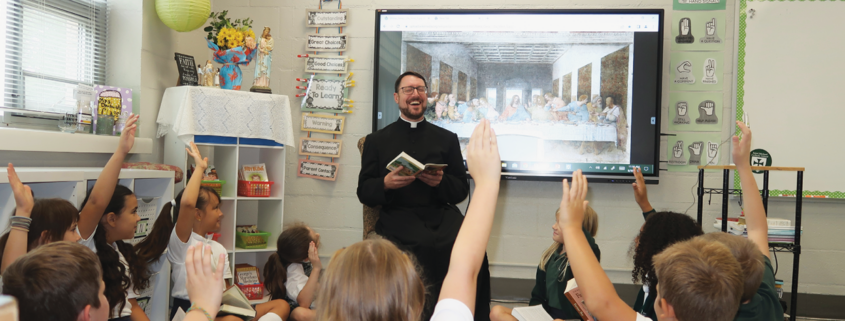Priests Are Needed in Faithful Catholic Education
by Rev. Peter M.J. Stravinskas
It seems that most priests either do not know or fail to comprehend the critical importance of Catholic schools in the life of the Church, particularly as a vehicle of the new evangelization. At a bishops’ meeting nearly a decade ago, Archbishop George Lucas and Bishop Daniel Flores lamented the fact that too many clerics over the past three decades have grown weary of the struggle to keep our schools viable, appealing, and accessible. “As Bishops, we must make every effort to assign pastors to parishes with schools who are champions of Catholic schools,” Bishop Flores said.
At the Catholic Education Foundation (https://catholiceducation.foundation), we have responded with an annual seminar to help seminarians, priests, and bishops be a powerful and energizing presence and influence in our schools. We also recently launched the Priestly Society of Christ Priest and Teacher, for priests engaged with Catholic high schools. In support of the effort, Mary Pat Donoghue, executive director of the U.S. bishops’ Secretariat of Catholic Education, said, “In this apostolic age, our schools must vibrantly witness to the teachings of Christ in every aspect of the school’s mission, from its curriculum and pedagogy to its culture and social elements. The guidance provided by a priest—an alter Christus—is critically important to this effort.”
In this work, I have found that the majority of the “junior clergy” are most supportive of Catholic schools, but they do not know exactly what they can or should be doing to advance the cause. This is either because they did not attend Catholic schools themselves, or they went to Catholic schools in an era when clerical involvement was low or even non-existent.
In fact, a very interesting study surfaced in 2019 on the attitudes of seminarians toward our schools. It was both encouraging and disturbing: encouraging, in that—unlike the older generation of priests—they are quite supportive of Catholic schools; disturbing, in that they say they have been given no tools in the seminary to prepare them for any role in the schools.
More Important than Ever
In one of St. John Henry Newman’s lectures which became his famous Idea of a University, he makes the point that, without the presence of the “institutional” Church in the life of a Catholic university, the project is bound to lose its moorings. That is equally true of Catholic education at the elementary and secondary levels.
 With the absence of priests, orthodoxy and Catholic identity waned in many places, leading to a further crisis in the schools. The mass exodus of women religious from the schools is yet another reason why the presence of priests is more important than ever.
With the absence of priests, orthodoxy and Catholic identity waned in many places, leading to a further crisis in the schools. The mass exodus of women religious from the schools is yet another reason why the presence of priests is more important than ever.
The involvement of a priest, however, is not simply or even primarily that of a watchdog. His involvement is needed to provide pastoral support for faculty and administration; to teach religion or other subjects according to his abilities; to be part of the lives of the students on the playground, in the cafeteria, and at social and athletic events; and, of course, for sacramental/liturgical services.
Not a few bishops—precipitously and very foolishly, in my opinion—withdrew priests from high school work, yet the presence of priests there provided one of the most effective “recruitment” devices we ever had for priestly vocations. Dioceses that have kept priests there—or which are putting them back—know that.
A priest is faced with many challenges as he navigates the waters of the school apostolate. The first is that of regularly reminding his people that the Catholic school is an essential element of Catholic life—whether or not there is a parish school, whether or not individuals have children of school age—and, therefore, deserving wholehearted support, as the Code of Canon Law reminds us.
Second, he must say some potentially unpopular things. For instance, families need to be told that attendance at the government schools (the so-called “public” schools) places the souls of children in jeopardy—a point highlighted in a study five years ago, which documented that Catholic children in the state schools most often lose their faith in God and the Church as early as fourth grade, due to the type of science classes they experience. And when we begin to consider topics related to marriage, family, and sexuality, the need for Catholic schools becomes more obvious than ever before. The aggressive promotion of “gender theory” and “critical race theory” in government schools across our nation should give any intelligent parent reason to make the local Catholic school the educational home for one’s children.
Third, the priest must ensure that no child is ever denied a Catholic education for want of financial resources.
Fourth, and this is often a very neuralgic piece of the whole project, he must help parents establish clear priorities: Is a winter vacation more important than a Catholic education for one’s children?
Priest Challenges:
-
Remind people that the Catholic school is an essential element of Catholic life.
-
Be prepared to say things unpopular regarding the threats of public school.
-
Ensure no child is ever denied a Catholic education for want of financial resources.
-
Help parents clearly prioritize a Catholic education.
A Saintly Example
John Henry Newman was a newly minted Cardinal in 1879, when he was asked by Archbishop Roger Bede Vaughan of Sydney to lend his voice to the defense of Catholic schools in Australia. With great eloquence and insight, he wrote:
It is indeed the gravest of questions whether our people are to commence life with or without adequate instruction in those all-important truths which ought to colour all thought and to direct all action;—whether they are or are not to accept this visible world for their God and their all, its teaching as their only truth, and its prizes as their highest aims;—for, if they do not gain, when young, that sacred knowledge which comes to us from Revelation, when will they acquire it?
Indeed, if not “when young… when?”
Reflecting on his involvement in the early years of his Oratory School in an 1862 letter to the President of St. Patrick’s Seminary in Ireland, Newman acknowledges:
I am overworked with various kinds of mental labour, and I cannot do as much as I once could. Yet it would be most ungrateful to complain, even if I were seriously incommoded, for my present overwork arises from the very success of a school which I began here shortly after I retired from the [Irish] University. When we began it was a simple experiment, and lookers-on seemed to be surprised when they found we had in half a year a dozen; but at the end of our third year we now have seventy… As all other schools are increasing in number, it is a pleasant proof of the extension of Catholic education.
An “Old Boy” of the Oratory School, Arthur Hungerford Pollen, recalled:
At the Oratory we saw a good deal of the Cardinal. Nothing pleased him more than making friends with the boys, and the many opportunities we had of personal contact with him made the friendship a real one. Of course, to us he was the greatest of heroes. . . . In the Latin plays which he had prepared for the boys to act he always took the keenest interest, insisting on the careful rendering of favourite passages, and himself giving hints in cases of histrionic difficulty. In the school chapel he from time to time appeared, giving a short address, and assisting at the afternoon service. It is curious that it should have been in connexion with these two widely different occupations that we should have seen most of him. It is, perhaps, characteristic of his disposition, in which playfulness and piety were so sweetly combined. (Cited in Wilfrid Meynell, Cardinal Newman, 86f.)
In 1879, a representative of the Oratory School Society observed in a letter to Newman:
Just twenty years ago you generously founded the Oratory School, and you have always cheerfully shared in the burden of toil and self-sacrifice which that act has entailed. We, on our part, gratefully acknowledge the benefits derived from the privilege of your personal influence and guidance after the wise and gentle way of St. Philip.
To which, Newman responded with a most priestly heart, placing the role of the priest in a Catholic school directly within one’s pastoral ministry and giving it preeminence: “No other department of the pastoral office requires such sustained attention and such unwearied services.”
St. John Henry, pray that our priests may imitate your selfless love and sacrifice on behalf of our beloved Catholic schools.
Rev. Peter M.J. Stravinskas
is president of the Catholic Education Foundation, which strives to preserve and expand Catholic elementary and secondary schools. He has served as an advisor to The Cardinal Newman Society and co-edited Newman’s Idea of a University: The American Response (Pine Beach, NJ: Newman House Press, 2002), a compilation of papers presented at a CNS conference in 2001.

